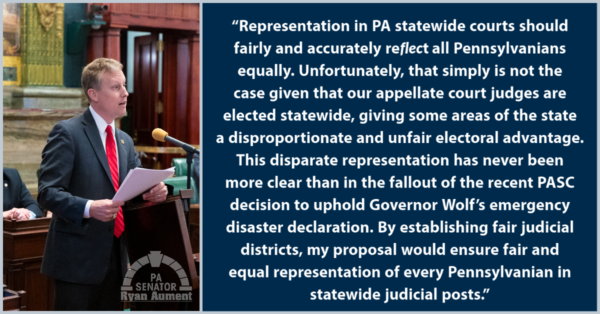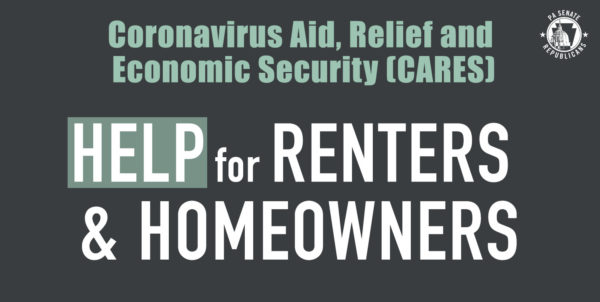
|
||
|
In This Update:
Supreme Court Rules Against Bipartisan Legislative Majority Seeking to End Emergency DeclarationAlthough precautions are still needed to prevent the spread of COVID-19, there is clearly no longer a need for Pennsylvania to remain under an emergency declaration. The only purpose the emergency declaration serves at this point is to allow Governor Wolf to bypass state laws, spend money without the authorization of the General Assembly, and ignore the will of the people – something the founders of our Commonwealth set out to prevent. A bipartisan group of lawmakers voted to end the emergency declaration last month by a concurrent resolution. Unfortunately, the Democrat majority of the state Supreme Court sided with Governor Wolf last week and refused to force him to do his Constitutional duty to end the emergency declaration. The General Assembly presented the resolution to Governor Wolf this week for his signature. Although the resolution is highly unlikely to earn the governor’s signature, I am hopeful that the fact that the measure drew nearly enough support to override the governor’s veto will serve as a reminder of the need to abandon unilateral decision-making and work together to do what is in the best interest of all Pennsylvanians. Although the court’s partisan ruling is a serious setback, I will continue to collaborate with the other legislative leaders to accomplish the important work that the Supreme Court refused to carry out – to limit the damage caused by the governor’s unilateral and flawed decision-making, and to restore the system of checks and balances that our government was founded on. Aument Reintroduces Legislation to Reform Statewide Judicial Elections, Ensure Fair Representation
Today, I reintroduced legislation that would guarantee that the diversity of Pennsylvania and the uniqueness of its various regions would be more accurately reflected in the election of appellate judges. Specifically, the bill would require approval of Pennsylvania’s voters, would divide the Commonwealth into nine (9) Commonwealth Court districts, fifteen (15) Superior Court districts, and seven (7) Supreme Court districts. The judicial districts would be drawn following the redistricting principles found in the Pennsylvania Constitution, and would also be consistent with any future Constitutional amendments to reform redistricting, such as the effort to establish an independent redistricting commission in Senate Bill 22. Importantly, candidates for appellate seats would be required to reside in the district they would represent on the court. The need to reintroduce this proposal now was further highlighted by the recent Pennsylvania Supreme Court opinion on House Resolution 836, in which the Court denied the General Assembly’s power to overturn Governor Wolf’s emergency disaster declaration. While I supported the passage of House Resolution 836 in the Senate, the Supreme Court’s decision effectively affirmed the legitimacy of the emergency disaster declaration, ensuring all aspects of it – including executive orders and guidance to businesses, individuals, and schools – remain in place until the Governor decides Pennsylvania is no longer in a state of emergency due to the COVID-19 global pandemic or the General Assembly can produce a supermajority to override him. I am not arguing that Pennsylvania’s statewide judges and justices should be swayed by or beholden to the court of public opinion when deciding cases, but rather that the process we use before those candidates are selected to serve in the courts ought to be reformed to ensure that all residents of Pennsylvania are represented fairly on the bench. The judicial branch must certainly operate independently of public opinion; however, it is inappropriate to permit statewide judges and justices to be chosen in a way that results in disproportionate representation. Read the full press release here. Deadline for Small Business Grants is July 14
Small businesses that were affected by COVID-19 can apply now through July 14 for state grants to offset financial losses caused by the statewide business shutdown order. The COVID-19 Relief Statewide Small Business Assistance program will provide grants ranging from $5,000 to $50,000 to affected businesses that have 25 or fewer employees and meet other eligibility criteria. Applications submitted after July 14 will be considered in future rounds of funding. Eligibility criteria, application details and other information on the program are available at https://pabusinessgrants.com/. Guidelines and Registration Info Available for COVID-19 Fire and EMS Grants
Volunteer fire and EMS companies can register now for grants to help deal with the increased costs for services and reduced fundraising opportunities during the COVID-19 pandemic. Under the program guidelines announced this week, the COVID-19 Crisis Fire Company and Emergency Medical Services Grant Program will provide a one-time grant to all companies that received funding through the Fire Company Grant Program and Emergency Medical Services Grant Program (FCEMSGP) in the latest round of funding. Companies that were awarded funding through the program earlier this year must register to receive the additional funding from the new one-time program. All surplus funding in the program will be distributed to each eligible company that meets the funding criteria and that submits a completed registration, including those that did not receive a 2019-2020 FCEMSGP grant award. Companies can register for the grants at the Office of State Fire Commissioner’s website by following the COVID-19 Fire, Rescue and EMS Grant Instructions. Rent and Mortgage Assistance Applications Available, Eviction Moratorium Extended
Legislation approved by the Senate in May directed a portion of the state’s funding from the federal Coronavirus Aid, Relief, and Economic Security (CARES) Act to provide financial assistance to renters and homeowners who are struggling financially due to the COVID-19 pandemic. The Pennsylvania Housing Finance Agency recently opened the application period for these new rent and mortgage assistance programs. The CARES Rent Relief Program provides assistance on behalf of low-income and moderate-income renters who experienced at least a 30 percent reduction in income due to the pandemic. Up to $750 per month in assistance is available for up to six months. Payments are made directly to the property owner. The full program guidelines detail eligibility and application information. The CARES Pandemic Mortgage Assistance Program provides up to $1,000 per month in assistance to low-income and moderate-income homeowners who suffered at least a 30 percent reduction in income during the pandemic and are at least 30 days delinquent on their mortgage. Under the program guidelines, payments are made directly to lenders. Applications can be completed online. In addition, the current statewide moratorium on evictions has been extended until August 31 to allow more time for Pennsylvanians impacted by the virus to access the new assistance programs. Senate Returns to Session Next Week
The Senate will return to session next week to work on a number of critical issues, including amendments to the state Constitution and other bills to increase government transparency. All of the floor votes, committee activity and other legislative action will be streamed live at pasenategop.com. |
||
|
||





Want to change how you receive these emails? 2024 © Senate of Pennsylvania | https://www.senatoraument.com | Privacy Policy |




